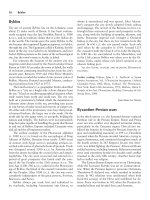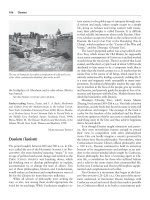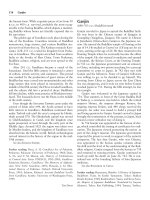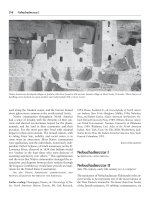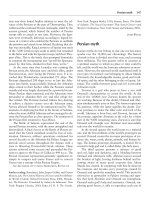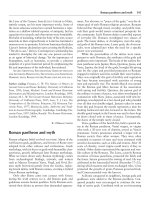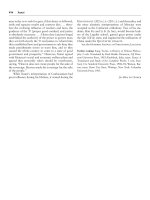Encyclopedia of world history (facts on file library of world history) 7 volume set ( PDFDrive ) 3275
Bạn đang xem bản rút gọn của tài liệu. Xem và tải ngay bản đầy đủ của tài liệu tại đây (82.79 KB, 1 trang )
W
Wajed, Sheikh Hasina
(1947– ) Bangladeshi leader
Sheikh Hasina Wajed is the president and head of
the Bangladesh Awami League. She is the daughter
of Sheikh Mujibur Rahman, the popular Bangladeshi leader who played a leading role in the founding of Bangladesh. Sheikh Hasina Wajed was one of
only two members of the Mujib family to survive a
bloody August 15, 1975, military coup.
Sheikh Hasina Wajed was born on September
28, 1947, in the city of Tungipara in the Gopalganj
district of Bangladesh. She earned her B.A. from
Dhaka University in 1973. During her school days,
she became active in politics, becoming the chief of
the Student Union at the Government Intermediate
College for Women in 1966. She and other members
of her family were imprisoned several times by Pakistan’s military government leading up to the Bangladesh liberation struggle in 1971.
After the assassination of Mujibur Rahman in
1975, Wajed was forced by the military government
of General Ziaur Rahman to live in exile until 1981.
In 1981 she became the president of the Bangladesh
Awami League.
With an absolute majority secured by her Awami
League in the 1996 election, Wajed became the prime
minister of Bangladesh on June 23. She took many
measures to alleviate rural poverty, enhance per capita income, create job opportunities, and increase
agricultural production. She also introduced new
welfare schemes, innovative housing programs in
rural areas that reversed the trend of migration from
rural to urban areas.
She was the leader of the opposition in the Bangladeshi parliament from 1986 to 1987, 1991 to
1993, and 2001 forward. Under her stewardship,
the Awami League boycotted parliament until June
2004, accusing the government of Khaleda Zia of
corruption and nepotism.
Wajed is a fierce, enigmatic leader who believes
in political parties based in the needs of the masses
and in mobilizing the party cadre to win elections.
Coming from a political family and with a father
who was a highly revered personality in Bangladesh
politics, Wajed is a political force to be reckoned
with and is likely to play a prominent role in Bangladeshi politics for the foreseeable future. She is also
an author of repute.
See also Bangladesh, People’s Republic of; Pakistan People’s Party.
Further reading: Habib, Zafarullah. The Zia Episode in
Bangladesh Politics. Dhaka: University Press of Bangladesh, 1997; Makasudra, Rahamana Mohammed. Politics
and Development of Rural Local Self-Government in
Bangladesh. Dhaka: Devika Publications, 2000; Rafiuddin, Ahmad. Religious Identity and Politics: Essays on
Bangladesh. New York: International Academic Publishers, 2002.
Mohammed Badrul Alam
455

